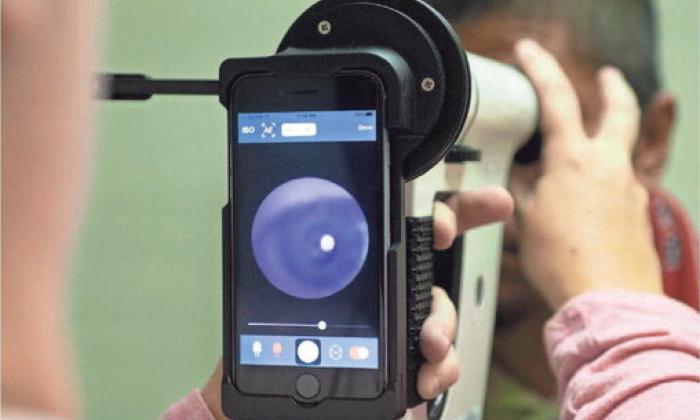Free Retinal Scans Help Vulnerable Populations

By Kevin Robinson | December 5, 2019 | Pensacola News Journal
Wendi Adams held up a cellphone and excitedly scrolled through a series of photos with her thumb.
With the same pride that most folks would have showing off photos of their kids or pets, Adams pointed out the clarity and color of images she had taken of the backs of people’s eyes. And while photos of eyes may seem like an odd subject matter, these retinal images can help doctors identify eye diseases before they escalate to more serious conditions like blindness.
Now through a new partnership, three local health care organizations — Community Health Northwest Florida, Intelligent Retinal Imaging Systems and Our Lady of Angels St. Joseph Medical Clinic — are providing free retinal scans to patients who might not otherwise be able to afford them.
“Catching (illness) early is key,” said Ann Papadelias of CHNF, with Kacie Bittner of IRIS adding that early detection is important because “If they can catch it there, they can keep it there.”
Both CHNF and St. Joseph work primarily with people who are uninsured or who have limited incomes. St. Joseph, a volunteer operated, faith-based clinic, has found over the years that a large percentage of its patients deal with diabetic issues, and the clinic has created a special metabolic program dedicated to helping those folks.
The new program will bring in a specialist from CHNF once a month to perform scans on 20 patients. IRIS will review the retinal scans and feed the results back to CHNF and the clinic, which will work with the Florida Division of Blind Services to ensure patients get the specific care they need.
Adams, an optometrist assistant at CHNF, said the new, handheld camera makes her work much easier. She noted the old camera was large and bulky, and was difficult to use if she needed to do screenings in locations outside of CHNF.
“Now I can go around and take photos there instead of having to bring them into the office,” Adams said.
The program is offered free of charge to patients, and data from CHNF indicates the services are sorely needed.
So far in 2019, the community clinic has done 865 retinal screens, and 44% of patients have tested with positive pathology such a diabetic retinopathy or glaucoma. CHNF attributes the high rate to the fact that many of the patients deal with chronic diseases and have had no prior access to vision screening services.
Dr. David Conkle, medical director at St. Joseph, said the clinic was blessed to have good partners, community support and dedicated volunteers, and that its 80-odd volunteers felt privileged to be able to serve their patients.
“We survive and are funded by the generosity of this community,” Conkle said.
“No one gets paid, and everybody comes here because they want to be here. Our patients are wonderful people, and it’s a pleasure for us to be able to help them.”
Get started with IRIS today.
Want to know if IRIS is right for you? Schedule a one-on-one consultation with our team. We’re here to help.